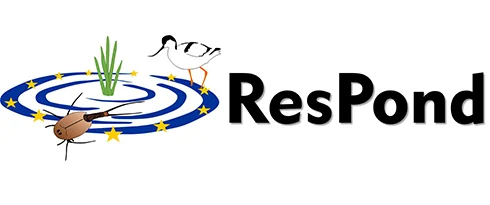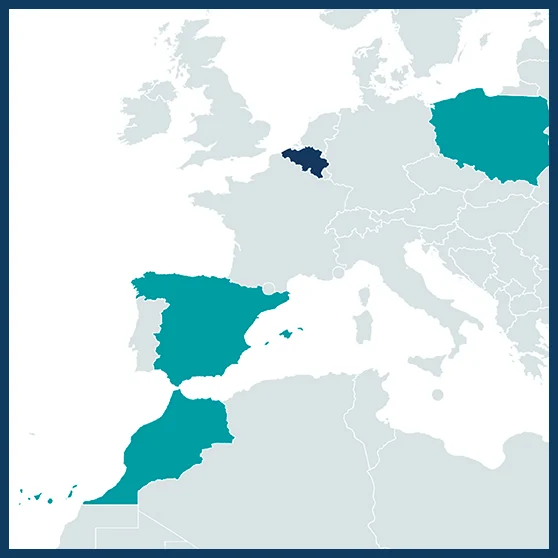
01/04/2021 – 31/03/2024
€ 1,182,860
Bram Vanschoenwinkel
bram.jasper.vanschoenwinkel@vub.be
Tom Pinceel
tom.pinceel@kuleuven.be
Coordinator: Center for Evolutionary and Functional Biology, Vrije University of Brussel, Elsene, Belgium
Animal Ecology, Global Change and Sustainable Development, KU Leuven, Leuven, Belgium
Biology, University Mohammed V, Rabat, Morocco
Environmental Biology, Adam Mickiewicz University, Poznań, Poland
Ecology, Autonomous University of Madrid, Madrid, Spain

Temporary ponds (i.e. ponds that seasonally dry) are a ubiquitous component of global biomes found from the equatorial forests to the arctic tundra. However, with the intensification of agriculture and hydrological modification of landscapes, these systems have largely disappeared in Europe and are often strongly degraded. Despite their unique biodiversity, most temporary ponds lack any formal protection. They also have a poor reputation. For instance, they are often overlooked or considered sources of mosquitoes. However, there are also strong indications that they fulfil important roles in landscapes but the full scope of ecosystem services they provide has not been quantified. Their biodiversity includes a threatened group of crustaceans: the large branchiopods. These have survived in temporary ponds since the Devonian period more than 350 million years ago and they are likely to have a disproportionately large effect on the proper functioning of these ecosystems as keystone species and ecosystem engineers. But this remains to be investigated.
In this context, five major issues will be tackled in ResPond: the unprotected status of most temporary ponds in Europe (i), the degraded status of most of these ponds (ii), the variable success of temporary pond restoration and creation projects (iii), the poor understanding of temporary pond ecosystem services which may be due to the absence of keystone species (iv) and the poor knowledge/ bad reputation of temporary pond with regards to ecosystem disservices (e.g. as a source of mosquitoes).
ResPond will implement the following activities:
- Develop an effective framework for temporary pond conservation in Europe and North Africa. ResPond will synthetise existing temporary pond survey in order to categorise them into separate conservation units. The units will be mapped in accordance with the level of protection and threat they are facing, to define prioritized conservation
areas. - Produce guidelines to reduce degradation and promote more effective conservation and restoration. This will be defined by combining information found in literature, and in consultation with pond managers and scientists.
- Reconstruct the ecosystem services of temporary ponds and the pivotal role of large branchiopods. Large scale experiments will be performed in Poland, Spain, Belgium and Morocco
The activities carried out by ResPond will involve governmental policy makers at the EU, national and regional levels, land owner and managers (eg. LIFE project coordinators, national parks, nature managers). During the course of the activities performed by ResPond, farmer organisations and NGOs (WWF anf Birdlife international) will also be consulted and collaborations with the European Pond Conservation network (EPCN) and the UK based Freshwater Habitat Trust (FHT) will help to disseminate knowledge through their respective platforms. Policy briefs, articles and meetings will allow ResPond to engage with these policy makers and stakeholders. Finally, ResPond will reach out to the local communities in Poland, Spain, Belgium and Morocco to develop generic communication tools (animation videos, organism search charts) reaching local communities in the EU and beyond.
The goal of this project is to be a catalyst for more effective long-term conservation of temporary pond biodiversity and ecosystem services. This will be done by synthesising available data on temporary pond biodiversity patterns and by experimentally resolving critical knowledge gaps that currently prevent more effective conservation and restoration.
ResPond will produce clear guidelines for temporary pond conservation, creation, and restoration, propose a regional conservation framework and organise a range of outreach activities. In the long run, this project aims to improve protection, reduce degradation, improve creation and restoration projects and improve the overall reputation of temporary ponds.
Project results will be provided to policymakers (e.g. EU organs such as the European Environment Agency, European Agricultural Agency and national and regional organs involved in nature and land management in different European member states as well as Morocco) to:
- Deliver scientific baseline information on this ecosystem type and its threats and identify leverage points for effective policy changes
- To increase the support base for policy changes at a regional, national or European level. Examples of policy changes could be to compensate farmers for temporary ponds on their land, or a future extension of the Habitats Directive in which different temporary pond types may be considered. The project’s guidelines may lead to improvements in management and creation of temporary ponds, e.g. by increasing the success of LIFE projects.
ResPond will perform joint experiments in Belgium, Poland, Spain and Morocco to expose the drivers of temporary pond ecosystem services and use a questionnaire-based approach to document the perceived services and disservices associated with this habitat.
- The Research Foundation – Flanders (FWO), Belgium
- Ministry of National Education, Vocational Training, Higher Education and Scientific Research (MENFPESRS), Morocco
- National Science Centre (NCN), Poland
- Agencia Estatal de Investigación (AEI), Spain